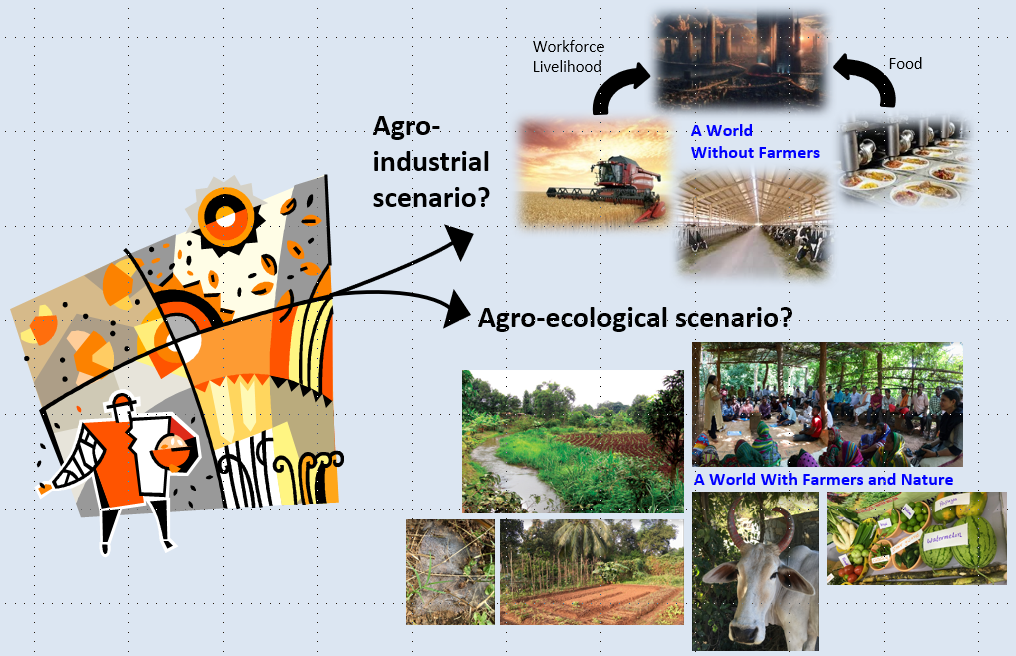- Home
- Worldwide
- CIRAD worldwide
- Projects
- AGROECO2050 project
AgroEco2050 foresight of natural farming in India - AGROECO2050

AgroEco2050 © Cirad
Issues
Since 2016, the government of Andhra Pradesh has been committed to backing and developing “natural farming”, farming that is regenerative, climate-resilient and managed by local communities. “Natural farming” is considered part of the science, movement and practice of agroecology. It places emphasis on soil life and landscape regeneration, highly diversified and synergistic crop and animal production, zero pesticide or chemical fertilizer use, self-help groups and training for and by farmers, both women and men. In April 2020, APCNF was already being practised by 700,000 farmers, with the hope of scaling up to 6 million by 2027 on 8 million hectares. This natural farming in Andhra Pradesh has attracted attention from other Indian States, central government and national and international institutions.
In such a context, it proves necessary to explore the socio-technical and economic conditions and implications of such a transformation, applying a rigorous approach and a multilateral process. To that end, the AgroEco2050 foresight seeks to explore and quantify the implications of two contrasting evolution scenarios for farming and well-being (employment, incomes and income inequalities, food, etc.) in Andhra Pradesh. The foresight also aims to contribute to national and international debates and research, on agroecology and on the future of food and agriculture.
Description
The main activities are:
- Extraction/documentation/checking/management of multiple datasets to reconstruct past trajectories (from the 1960s to date) and quantify some complete and coherent scenarios for 2050;
- Development of a model and computer interface (“Agribiom-India”) enabling: (i) collective visualization and discussion of historical tendencies on different geographical scales; (ii) live recording of scenario hypotheses and interactive simulations with the latter; and (iii) archiving and sharing of sets of quantitative results (scenarios or variants) with their hypotheses;
- Expert workshops revisiting the past and debating on the scenarios with the Agribiom-India quantitative tool and members’ expertise;
- Drafting and dissemination/discussion of the results with a wider audience, through seminars and publications (policy brief, synopsis report, full report/book).
Expected changes
- A foresight exercise along the lines of the French “Agrimonde: scenarios and challenges for feeding the world in 2050”, with the collective building of scenarios to assemble and compare different visions and assessments leading to action;
- Collection, aggregation, visualization and sharing of a large volume of data and information from different sources on the evolution of the Indian States (including Andhra Pradesh) over recent decades (at least since the 1970s), with a view to understanding those structural evolutions in the most comprehensive, collective and consensual manner possible;
- A finetuned vision of “natural farming” (APCNF) backed up with data, models and expertise that can be quoted, discussed and debated;
- Assertion of the environmental, economic and social sustainability of natural farming, notably regarding the income of millions of agricultural microproducers who cannot find employment in the rest of the economy;
- Comparison of an agroecology scenario with a scenario tending towards the industrialization of farming (continuation of the green revolution and its few mass production crops, with genetic engineering, irrigation, chemical fertilizers, pesticides, robotization, etc.), in order to assess their respective limitations and advantages for various aspects (food security, employment and income inequality, farm labour output, soil health, water availability and quality, climate change mitigation, biodiversity and resilience to biotic and abiotic shocks, etc.);
- An innovative methodology able to anticipate, quantify, debate and support the longterm scaling-up of agroecology, in other Indian States or elsewhere in the world.
























